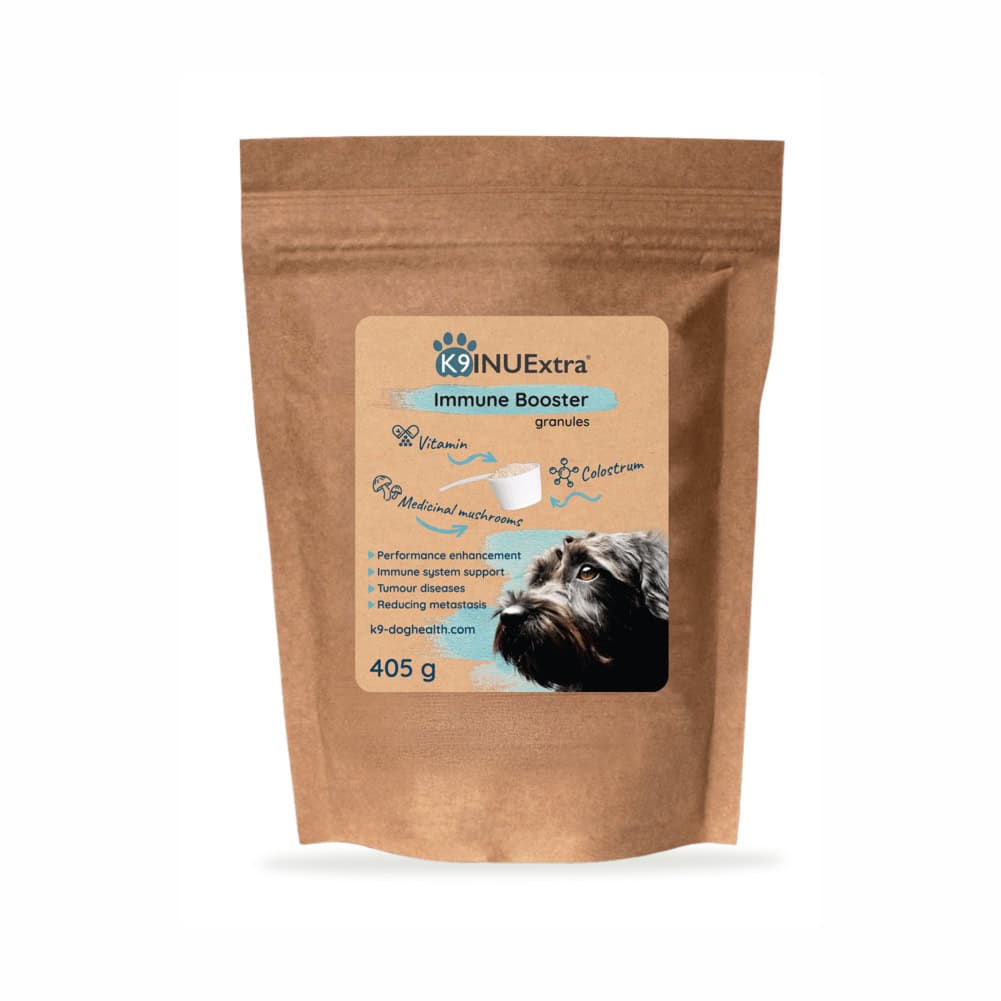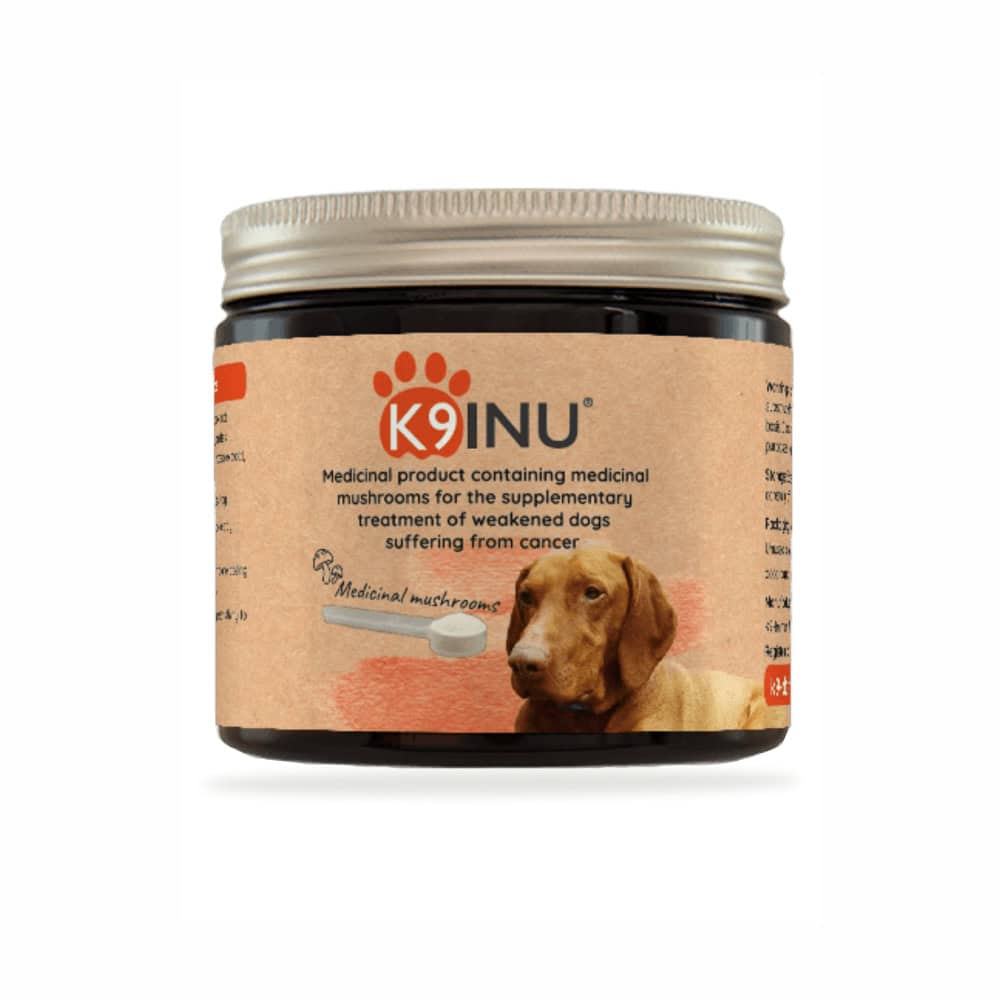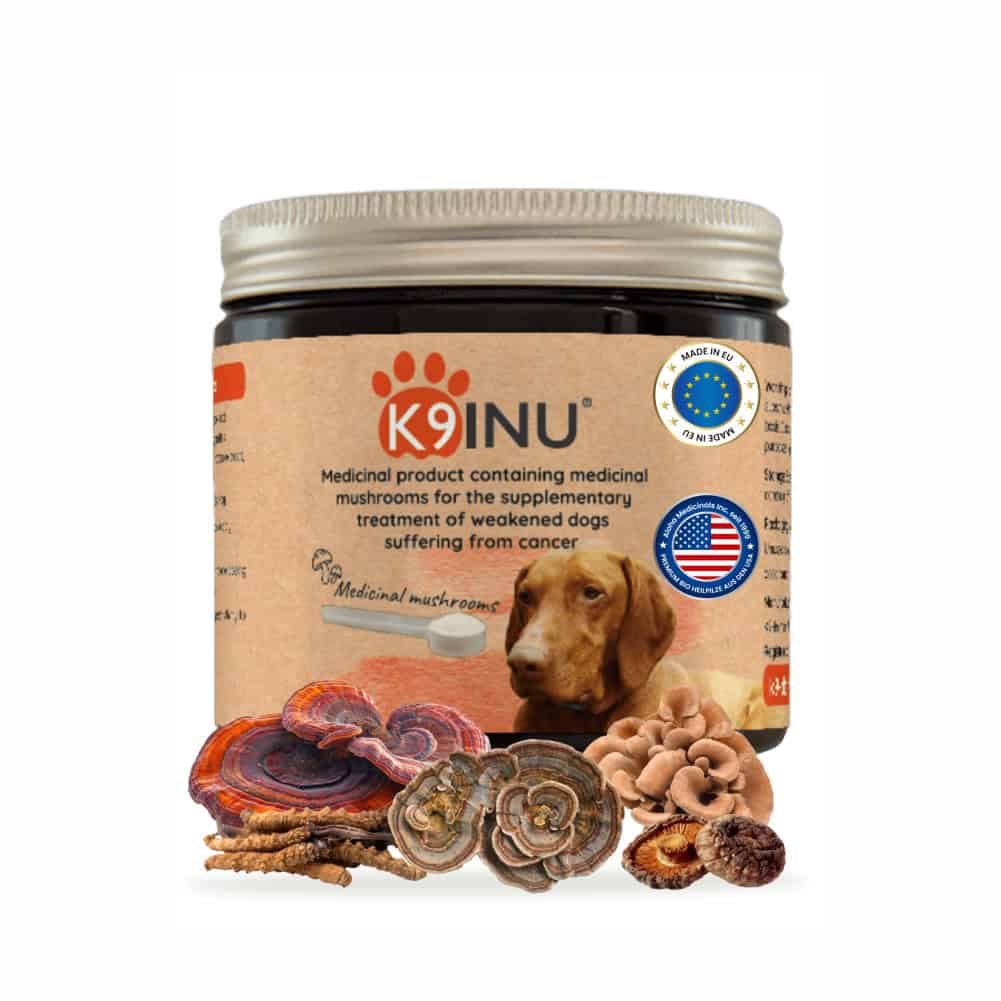Brain tumors in dogs – Symptoms, diagnosis, treatment and daily care
Brain tumors in dogs are abnormal cell growths that develop either within the brain itself or in the membranes covering the brain (meninges). They may be primary (originating in the brain) or secondary (metastatic, spreading from another organ). Their occurrence increases with age; most affected dogs are middle-aged or older. The most common primary tumor is meningioma (arising from the membranes covering the brain), followed by gliomas (originating from the brain tissue). In other words, meningiomas start in the brain’s coverings, while gliomas begin within the brain tissue itself.
Types and frequency of dog brain tumors
- Meningioma: common, often slower-growing, and in some cases treatable.
- Gliomas (oligodendroglioma, astrocytoma, GBM-spectrum): usually more aggressive with modest treatment outcomes.
- Others: lymphomas, pituitary-origin tumors, metastases.
Dog brain tumor symptoms
Dog brain tumor symptoms depend on the location and growth rate of the tumor. The most common is late-onset seizures (epileptic-like fits), along with behavior changes, circling, ataxia, head tilt, vision problems, nystagmus, “head pressing,” loss of appetite, and nausea due to increased intracranial pressure.
- New or worsening seizures
- Balance issues, unsteady gait (ataxia)
- Behavioral changes: confusion, restlessness, aggression
- Vision problems, unequal pupils, eye flickering
- Signs of headache: pressing head against walls, visible discomfort
Diagnosis
After a neurological examination, magnetic resonance imaging (MRI) is the diagnostic tool of choice, as it provides more detailed brain images than CT. Final classification is confirmed by biopsy and histopathology. Basic blood tests and abdominal/chest imaging are also performed to assess general health and check for possible metastases.
Treatment options for brain tumors in dogs
Surgery
Surgery may be an option for well-defined, favorably located meningiomas. In these cases, the main aim is to reduce the mass effect and relieve pressure. However, results are generally less favorable in gliomas.
Radiation therapy
Recent studies show that in meningiomas, radiotherapy leads to longer survival compared with surgery alone. A modern technique is stereotactic fractionated radiotherapy (SRT). Put simply, this means the radiation precisely targets only the tumor area, sparing healthy brain tissue as much as possible.
Medication (Chemotherapy and supportive drugs)
For gliomas, several chemotherapy drugs have been tried, such as temozolomide or lomustine. These are specialized anticancer drugs that may slow tumor growth. In practice, these are medications also used in human oncology. Research results are not always consistent, but some dogs show improvement. Antiepileptics can be prescribed for seizures, and steroids for brain swelling.
Innovative/Clinical trials
New directions include targeted therapies and ultrasound-based tumor ablation in dogs. Essentially, this means that the tumor is destroyed with special energy, without surgery.
Alternative and immunomodulatory therapies
In addition to traditional treatments (surgery, radiotherapy, chemotherapy), more attention is being given to natural and complementary methods. Important: these do not replace veterinary therapy, but they may strongly support the immune system and improve the dog’s quality of life.
Immunomodulatory therapy
Immunomodulatory treatments aim to strengthen the dog’s immune system so it can better recognize and suppress cancer cells. Experimental research shows that certain immunotherapies – such as special peptides or vaccines – may be more effective when combined with other therapies. While these are mainly available in clinical trials, everyday natural immune boosters are accessible and work on similar principles.
Medicinal mushrooms and natural immune support
In recent years, there has been great interest in medicinal mushrooms such as Reishi (Ganoderma), shiitake, and Turkey tail. These natural supplements contain bioactive compounds with immune-boosting, anti-inflammatory, and anti-tumor properties. Experience suggests they may help dogs with cancer maintain vitality, reduce side effects of conventional treatments, and improve overall well-being.
Many pet owners choose mushroom supplements for their dogs with cancer because they are safe, natural, and easily integrated into daily care routines. They are not miracle cures, but they can provide strong support to the immune system and enhance the dog’s quality of life.
Clinical research and experimental approaches
Worldwide studies are ongoing into therapies that stimulate the immune system (e.g., tumor vaccines, T-cell-based therapies, CAR-T cells). While not yet routinely available, the results are promising: in the future they may help dogs live longer and with a better quality of life.
What should you keep in mind when choosing alternative therapies?
- Always consult a veterinarian before using any supplements.
- Choose products from trusted sources to ensure safety and correct active ingredient levels.
- Long-term use of medicinal mushrooms provides gentle but continuous immune support.
- Keep expectations realistic: these methods are not “miracle cures” but strong allies in comprehensive therapy.
Prognosis of brain tumors in dogs
- Meningioma: radiation therapy generally provides longer survival compared to surgery alone.
- Gliomas: prognosis is usually poorer; combined treatment (surgery + chemotherapy) sometimes offers modest survival benefit.
- Palliative approach: steroids, anti-seizure medications, and painkillers may bring temporary improvement; focus is on quality of life.
Quality of life and palliative care
Not every dog is a candidate for surgery or radiation therapy. However, in such cases the main goal is to relieve symptoms and increase comfort. This may include steroids for swelling, antiepileptics for seizures, pain relief, anti-nausea medication, and anxiety management. In addition, a veterinary neurologist can help tailor the plan to the individual dog, ensuring the most suitable approach.
Remember: beyond medications, small daily acts of care – a comfortable bed, a calm environment, patience, and love – are equally important in supporting your dog. Therefore, focusing on both medical and emotional support can make a real difference in your pet’s quality of life.
Daily home care for dogs with brain tumors
-
- Safe environment: remove sharp objects and, in addition, prevent slipping in case of seizures.
- Routine and predictability: keep regular feeding and walking times, and also minimize stress whenever possible.
- Accessibility: ensure easy access to water, food bowls, and bedding; moreover, limit the use of stairs.
- Symptom diary: record seizure times, duration, and triggers; furthermore, short videos can help veterinarians.
- Nursing support: ask for advice on nutrition, pain control, and managing side effects, so that your dog receives the best possible care.

Brain tumors in dogs – Prognosis and decision-making
Prognosis varies widely. For meningiomas, modern radiotherapy can extend survival by months or even years, while in gliomas the benefit is more modest. If the owner and vet choose a palliative approach, quality of life becomes the focus. Do not face the decision alone: seek a second opinion, involve family, and rely on supportive communities.
Summary
Brain tumors in dogs are serious, but not hopeless. Early recognition, targeted diagnostics (MRI), personalized treatment, and conscious home care can significantly improve outcomes. Dog brain tumor symptoms (especially late-onset seizures) should always prompt prompt veterinary consultation. Radiotherapy for meningiomas often results in better survival, while research on gliomas continues to explore new options.
Frequently asked questions about brain tumors in dogs
❓ What are the most common signs of brain tumors in dogs?
The most frequent signs include new-onset seizures, behavior changes, balance problems, head tilt, and vision disturbances. Depending on tumor location, other neurological issues may appear.
❓ Does my dog feel pain with a brain tumor?
A brain tumor does not always cause direct pain, but increased intracranial pressure can lead to headache-like symptoms. Dogs may press their heads against walls, be sensitive to light, or appear restless. Pain relief and steroids can help reduce discomfort.
❓ How long can a dog live with a brain tumor?
Survival depends largely on tumor type and treatment. In meningiomas, radiotherapy may extend life by years, while gliomas usually allow for only months of extra time. Palliative care can still improve quality of life.
❓ What quality of life can my dog expect?
With proper medication, symptom control, and loving care, many dogs live comfortably for months. Controlling seizures, managing pain, and ensuring a safe and cozy environment are key to maintaining good quality of life.
❓ Can brain tumors in dogs be cured?
Complete cure is rare. For meningiomas, surgery combined with radiotherapy can achieve good results. For gliomas, treatment usually aims at improving survival time and quality of life rather than cure.
❓ What tests are used to diagnose a brain tumor canine?
The most accurate test is MRI, which provides detailed brain images. Neurological exams, blood work, and additional imaging (CT, chest/abdominal ultrasound) also help establish the diagnosis.
❓ How can I support my dog with a brain tumor at home?
Providing a safe environment, comfortable bedding, keeping a seizure diary, consistent medication, and loving daily care can improve your dog’s well-being. Supplements such as immune boosters and medicinal mushrooms may also help.
More about dog cancers
- Osteosarcoma in dogs
- Hemangiosarcoma in dogs
- Lymphoma in dogs
- Dog mammary tumor
- Mast cell tumor in dogs
If you’d like to learn more about the role of natural supplements in canine cancer care, read our articles on the benefits of reishi mushrooms for dogs, turkey tail mushrooms for dogs, or the different dog tumor types. You may also find it useful to explore topics such as restoring the dog’s gut flora and dog diarrhea, as these are closely linked to immune system health. And if you’re curious about production, check out our overview on how medicinal mushrooms are made.
Important: This article is for informational purposes only and does not replace veterinary examination or treatment. For an accurate diagnosis and the right therapy, always consult your veterinarian.
References:
- Bagley, R. S., et al. (1999). Clinical signs associated with brain tumors in dogs: 97 cases (1992–1997). Journal of Veterinary Internal Medicine, 13(6), 436–442.
- Geiger, R., et al. (2025). Comparison of survival after treatment of presumed intracranial meningioma in dogs: Radiotherapy vs surgery. Journal of Veterinary Internal Medicine.
- Texas A&M VMBS. (2025, April 29). Dogs with meningiomas live longer with radiation therapy than surgery. Press release.
- José-López, R., et al. (2023). Chemotherapy for the treatment of intracranial glioma in dogs. Veterinary and Comparative Oncology.
- NC State Veterinary Hospital. (n.d.). Neurology: Brain tumors in dogs and cats; imaging and MRI.
- Loeber, S., et al. (2024). MRI characteristics of primary brain tumors and inflammatory diseases in dogs and cats. Frontiers in Veterinary Science.
- Hidalgo Crespo, E., et al. (2022). Survival time after surgical debulking and temozolomide in canine gliomas. Veterinary Sciences, 9(8), 427.
- Texas A&M University. (2024, Feb 20). Genetic links between human and canine meningiomas. Acta Neuropathologica.






